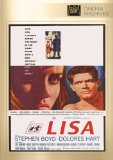| Reviews & Columns |
|
Reviews DVD TV on DVD Blu-ray 4K UHD International DVDs In Theaters Reviews by Studio Video Games Features Collector Series DVDs Easter Egg Database Interviews DVD Talk Radio Feature Articles Columns Anime Talk DVD Savant Horror DVDs The M.O.D. Squad Art House HD Talk Silent DVD
|
DVD Talk Forum |
|
|
| Resources |
|
DVD Price Search Customer Service #'s RCE Info Links |
|
Columns
|
|
|
Lisa (1962, Fox Cinema Archives)
Well...letterboxing is better than pan-and-scan, I guess.... 20th Century-Fox's Cinema Archives, their reservoir of hard-to-find library and cult titles, has released Lisa (international title: The Inspector), the 1962 romance actioner starring Stephen Boyd, Dolores Hart, and a wealth of talented U.K. supporting performers: Leo McKern, Hugh Griffith, Donald Pleasence, Harry Andrews, Robert Stephens, Finlay Currie, and Marius Goring. Based on the book by Jan De Hartog, Lisa uses solid performances and good location work to help overcome some of its clunkier (and somewhat fuzzy) exposition, giving fans of such romantic chase work a decent enough time at the movies. No extras for this okay, properly-ratioed--but flat--letterboxed widescreen transfer.
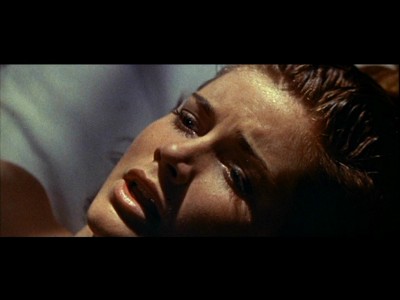
Holland, 1946. Dutch police inspectors Peter Jongman (Stephen Boyd) and Sgt. Wolters (Donald Pleasence) are trailing white slaver Thorens (Marius Goring), trying to determine if the girl he's transporting to London, Auschwitz survivor Lisa Held (Dolores Hart), is of legal age. She is, and there's nothing the officers can do, but Jongman still follows them to London, savagely beating Thorens and then promising Lisa he'll take her to Palestine. Lisa soon learns why a guilt-stricken Jongman wants to help her: as a policeman during the Nazi occupation of Holland, Jongman stood by and did nothing when his fiance was carted off to the death camps. Escaping Holland by barge, with the help of gruff Captain Brandt (Leo McKern), their arrival in Tangiers is met with further complications: smuggler Van der Pink (Hugh Griffith) wants Jongman to sign himself into indentured servitude as payment for Lisa's trip to Palestine, and American smuggler Browne (Neil McCallum), wants Lisa to return to Germany to testify about the horrors she experienced as a human guinea pig for the concentration camp doctors. Soon, Jongman must deal with British secret service agent Dickens (Robert Stephens) in negotiating Lisa's illegal entry into Palestine
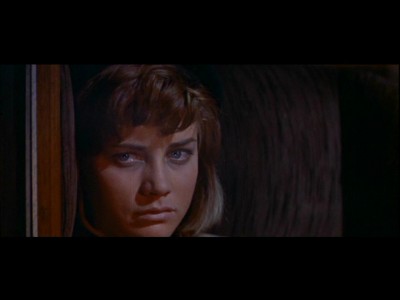
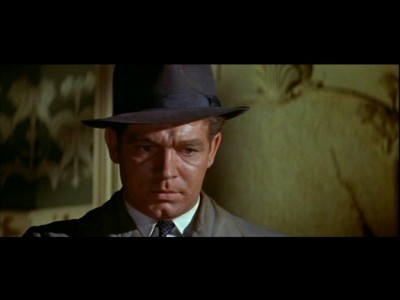
A just-middling critical success back in 1962, and a box office disappointment (I wonder if Fox was hoping for their own Exodus smash), I would imagine the biggest draw today for catching Lisa would be for those curious to see Dolores Hart in what many consider her best dramatic role. As movie fans well know, gorgeous, talented Hart's celebrated 1963 retreat from sure-fire movie stardom into a Connecticut nunnery is one of Hollywood's most intriguing true-life stories; subsequently, knowing that story seems to color our perceptions of her few movie turns: we watch her, and we wonder. I can't say I saw any sort of epiphany on display here, but what did come through was a rather impressive performance from Hart that was quite unexpected in this kind of expensive, glossy actioner. "Down to earth" reads inadequately for what Hart accomplishes here; that term sounds too prosaic, too uneventful for the full range that Hart expresses in her role of the Auschwitz survivor. Yet, that phase lends itself to how naturalistically she achieves her Lisa. We expect the role to be "showy," considering the context (sexually mutilated concentration camp survivor falling in love with her copper protector), but Hart is the opposite of that. Rather than the mechanical whirrs and clicks of a typical Meryl Streep endurance test, or the shallow, Freudian self-castigation of a Jane Fonda twitch-fest, Hart's turn is simply applied yet surprisingly powerful precisely because it's so "clean" and art-less (in the best sense of that word).
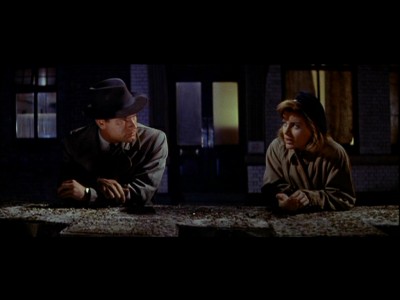
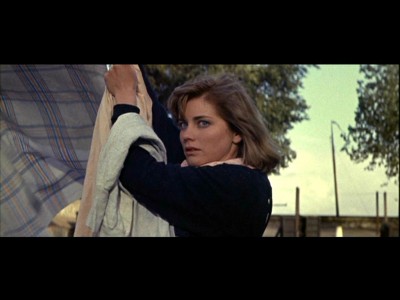
Of course, what's deeply ironic about that kind of self-contained, interior, deeply-felt performance is that it winds up being largely at odds with this big Hollywood machine of a chase picture. The conflicting styles don't mesh; you almost need something a little more "big," more phoney, strange to say, to anchor all the emphasis on pictorial splendor and suspense set pieces here (or else a drama that isn't as much about the pretty pictures and suspense). Produced by Mark Robson (who knew a thing or two about glossy melodrama: Peyton Place, The Inn of the Sixth Happiness, From the Terrace, Valley of the Dolls), scripted by Nelson Gidding (I Want to Live!, The Helen Morgan Story), and directed by screenwriter Phillip Dunne (Wild in the Country, Blindfold), Lisa may seem to have at its core a love story complicated by the horrors of the camps, but its heart really lies in the chase, and unfortunately, those suspense sequences are set-up with little grace or finesse in the transitions. We bump along from scene to telegraphed scene, two steps ahead of the narrative at all times, while we're encouraged, uncomfortably, to ponder the movie's hook: what exactly happened to Lisa in the camps, and will she eventually be able to have sex again. To the filmmakers' credit, they try and de-sensationalize this aspect as much as possible, with Hart's remarkable recitation of what happened to her in the medical experimentation block of Auschwitz--shot in tight, agonized close-up--making a mockery of the grotesque titillation of the movie's one-sheet ("How Can a Woman Spend the Night in the Same Room With a Man Without Getting Into His Arms?" "The Desperate Liaisons of the Love-Pursuers Startlingly Uncovered!"). The journey seems far longer than it really is because the construction is so choppy; fortunately, those set pieces are populated with first-rate performers, with McKern and Griffith notching their usual (delightfully) hammy shtick, and Stephens doing interesting work as a British spy. Boyd, always better when he was quiet and thoughtful, is excellent playing off Hart; backed by the soaring, memorably sad theme by composer Malcolm Arnold, their scenes together pack an emotional weight that's more a testament to their skills...rather than to anyone helping behind the camera.

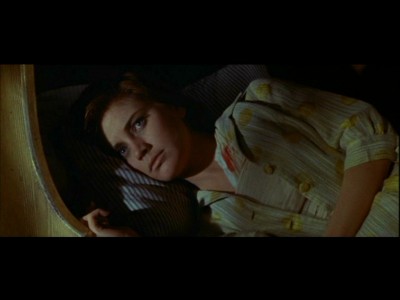
The DVD:
The Video:
Releasing a CinemaScope® picture "flat" seems so 1998...but at least it ain't panned-and-scanned. The non-anamorphic letterboxing looks a bit dark, and grain is a problem at times (as is print damage here and there), but overall...not bad, considering.
The Audio:
The Dolby Digital English mono audio track is okay, with a decent-enough re-recording level and low hiss. No closed-captions or subtitles available.
The Extras:
No extras.
Final Thoughts:
The performers outshine the material. Lisa's big Hollywood machine feel conflicts with Dolores Hart's beautifully simple, powerful turn here, but it's worth wading through the bumpy heroics to see it. Not the most optimal presentation here, either...however, I'm still recommending Lisa.
Paul Mavis is an internationally published movie and television historian, a member of the Online Film Critics Society, and the author of The Espionage Filmography.


|
| Popular Reviews |
| Sponsored Links |
|
|
| Sponsored Links |
|
|
| Release List | Reviews | Shop | Newsletter | Forum | DVD Giveaways | Blu-Ray | Advertise |
|
Copyright 2024 DVDTalk.com All Rights Reserved. Legal Info, Privacy Policy, Terms of Use,
Manage Preferences,
Your Privacy Choices | |||||||









